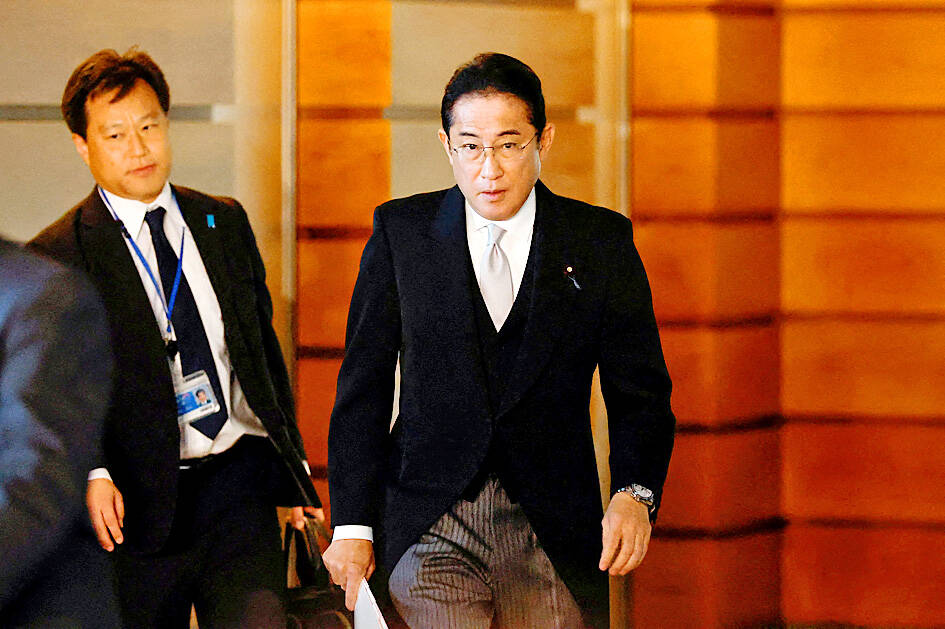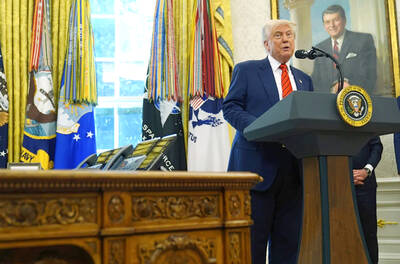Japanese Prime Minister Fumio Kishida shuffled his Cabinet and key party posts yesterday in an apparent move to strengthen his position before a key party leadership vote next year, while appointing more women to showcase his effort for women’s advancement in his conservative party.
It is the second Cabinet shuffle since Kishida took office in October 2021 when he promised fairer distribution of economic growth, measures to tackle Japan’s declining population and a stronger national defense. Russia’s war in Ukraine, rising energy prices and Japan’s soaring defense costs have created challenges in his tenure, keeping his support ratings at low levels.
Kishida’s three-year term as Liberal Democratic Party (LDP) president expires in September next year, when he would seek a second term. His faction is only the fourth largest in the LDP, so he must stay on good terms with the others to maintain his position.

Photo: Reuters
He distributed Cabinet posts to reflect the balance of power, and nearly half of the positions are shared between the two largest factions associated with former prime ministers Shinzo Abe and Taro Aso.
Kishida appointed five women to the 19-member Cabinet, part of his attempt to buoy sagging support ratings for his previous male-dominated Cabinet, which had only two women. The five females match the number in two earlier Japanese Cabinets — in 2014 and 2001. Women still hold only one-quarter of the total posts in the new Cabinet.
One of the five, Yoko Kamikawa, a former justice minister, takes the post of foreign minister to replace Yoshimasa Hayashi. Both Kamikawa and Hayashi are from Kishida’s own faction.
The LDP supports traditional family values and gender roles, and the omission of female politicians is often criticized by women’s rights groups as democracy without women.
Minister of Economy, Trade and Industry Yasutoshi Nishimura, Minister of Finance Shunichi Suzuki, Minister for Digital Transformation Taro Kono as well as Minister of Economic Security Sanae Takaichi, were among the six who stayed.
Kishida’s Cabinet had resigned en masse in a ceremonial meeting yesterday before retained Chief Cabinet Secretary Hirokazu Matsuno announced the new lineup.
Kishida also kept his main intraparty rival Toshimitsu Motegi at the No. 2 post in the party and retained faction heavyweights like Aso in other key party posts.
Kishida is expected to compile a new economic package to deal with rising gasoline and food prices, which would be necessary to have wage increase continue and support low-income households in order to regain public support.
Two figures who lost posts in the shakeup had been touched by recent scandals.
Former agriculture, forestry and fisheries minister Tetsuro Nomura was reprimanded by Kishida and apologized after calling the treated radioactive wastewater being released from the Fukushima Dai-ichi nuclear power plant “contaminated,” a term China uses to characterize the water as unsafe.
Magazine reports have contained allegations that former deputy chief cabinet secretary Seiji Kihara influenced a police investigation of his wife over her ex-husband’s suspicious death.
Kishida last shuffled his Cabinet a year ago after Abe’s assassination revealed ties between senior ruling party members and the Unification Church, a South Korea-based ultra-conservative sect.

A new online voting system aimed at boosting turnout among the Philippines’ millions of overseas workers ahead of Monday’s mid-term elections has been marked by confusion and fears of disenfranchisement. Thousands of overseas Filipino workers have already cast their ballots in the race dominated by a bitter feud between President Ferdinand Marcos Jr and his impeached vice president, Sara Duterte. While official turnout figures are not yet publicly available, data from the Philippine Commission on Elections (COMELEC) showed that at least 134,000 of the 1.22 million registered overseas voters have signed up for the new online system, which opened on April 13. However,

ALLIES: Calling Putin his ‘old friend,’ Xi said Beijing stood alongside Russia ‘in the face of the international counter-current of unilateralism and hegemonic bullying’ Chinese President Xi Jinping (習近平) yesterday was in Moscow for a state visit ahead of the Kremlin’s grand Victory Day celebrations, as Ukraine accused Russia’s army of launching air strikes just hours into a supposed truce. More than 20 foreign leaders were in Russia to attend a vast military parade today marking 80 years since the defeat of Nazi Germany in World War II, taking place three years into Russia’s offensive in Ukraine. Putin ordered troops into Ukraine in February 2022 and has marshaled the memory of Soviet victory against Nazi Germany to justify his campaign and rally society behind the offensive,

CONFLICTING REPORTS: Beijing said it was ‘not familiar with the matter’ when asked if Chinese jets were used in the conflict, after Pakistan’s foreign minister said they were The Pakistan Army yesterday said it shot down 25 Indian drones, a day after the worst violence between the nuclear-armed rivals in two decades. Pakistani Prime Minister Shehbaz Sharif vowed to retaliate after India launched deadly missile strikes on Wednesday morning, escalating days of gunfire along their border. At least 45 deaths were reported from both sides following Wednesday’s violence, including children. Pakistan’s military said in a statement yesterday that it had “so far shot down 25 Israeli-made Harop drones” at multiple location across the country. “Last night, India showed another act of aggression by sending drones to multiple locations,” Pakistan military spokesman Ahmed

US President Donald Trump on Wednesday said that he would make a decision about how the US government would refer to the body of water commonly known as the Persian Gulf when he visits Arab states next week. Trump told reporters at the White House that he expects his hosts in Saudi Arabia, Qatar and the United Arab Emirates will ask him about the US officially calling the waterway the Arabian Gulf or Gulf of Arabia. “They’re going to ask me about that when I get there, and I’ll have to make a decision,” Trump said. “I don’t want to hurt anybody’s